My Approach to Therapy
As an integrative psychotherapist, I draw on a variety of different theoretical orientations, approaches, and techniques in my work with clients. Operating from a humanistic, person-centered, and existentialist framework, I am influenced by modern psychodynamic (especially relational and attachment theory) and family-systems (internal and external) approaches. In addition, I regularly incorporate elements of cognitive-behavioural therapy (CBT), emotion-focused therapy (EFT), narrative therapy, mindfulness, and sensorimotor (body-focused) interventions into my practice.
Please see the brief descriptions below which highlight aspects of the theoretical orientations that influence my integrative approach to therapy. If you are interested in learning more about any particular approach, you can click the links below for more thorough explanations.
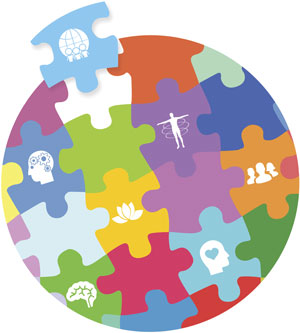
While some approaches to therapy will work better than others for particular people in certain circumstances, no one form of therapy will work for all people in all situations. Each theory and approach to therapy has its own strengths and limitations. Integrative psychotherapy aims to synthetize a variety of different therapeutic orientations, capitalizing on the strengths of some approaches to fill the gaps left by the shortcomings of others, in a way that is tailored to the needs of each client and their presenting issues. [more info]
Another meaning of integrative psychotherapy emphasizes the bringing together and unifying of different parts or aspects of a person with the goal of fostering a sense of wholeness and unity within the individual. An integrative therapist takes into account the physiological, cognitive, emotional, interpersonal, sociocultural, and spiritual aspects of each person, bringing them into the therapy session when they are relevant to fulfilling the client’s therapeutic goals. [more info]
Humanism is a perspective that emphasizes the wholeness, uniqueness, freedom, and growth potential of human beings. Humanistic therapies are person-centered, which means that they emphasize the importance of understanding each individual’s conscious, subjective experience of reality in the “here-and-now” of the present moment. The existential perspective appeals to the universality of certain aspects of the human condition that all people must confront in life: mortality; freedom and personal responsibility; isolation; and the need to create meaning. [more info]


Humanism is a perspective that emphasizes the wholeness, uniqueness, freedom, and growth potential of human beings. Humanistic therapies are person-centered, which means that they emphasize the importance of understanding each individual’s conscious, subjective experience of reality in the “here-and-now” of the present moment. The existential perspective appeals to the universality of certain aspects of the human condition that all people must confront in life: mortality; freedom and personal responsibility; isolation; and the need to create meaning. [more info]

In general, the psychodynamic approach aims to help clients gain insight into the unconscious processes that drive their behaviours and may be contributing to their current concerns. While there are many different schools of psychodynamic thought, relational and attachment theories emphasize the interrelatedness of how people develop a sense of self and form relationships with others – aspects of experience that play a central role in the lives of most human beings.
In therapy, clients have the opportunity shed light onto their “relational patterns” and ways of being in relationships (past and present), both in their personal lives and the therapeutic relationship itself. In doing so, clients can gain the opportunity to make different choices in relationships and have different relational experiences, which can ultimately lead to an increased range of freedom, flexibility, creativity, vitality, and spontaneity in their lives. [more info] [additional info]
Developed by Dr. Murray Bowen, family systems theory emphasizes that people cannot be understood only as isolated, self-contained individuals, but must also be viewed as members of an “emotional unit” that is their family. Whether examining a person’s current family or family of origin (i.e. the family that the person was born into and/or grew up with), family systems theory looks at what roles the individual played, what responsibilities they took on, and how these factors may continue to play out in the person’s present life. [more info]
Internal Family Systems (IFS) is a model of therapy developed by Dr. Richard Schwartz that integrates systems theory and applies it to the internal psychology of human beings. IFS posits that everyone has multiple discrete sub-personalities (or “parts” of themselves), as well as a underlying core Self that is greater than the sum of their parts. IFS therapy aims to help people identify and get to know parts of themselves with curiosity and compassion, and in turn to help them shift out of unhelpful roles that they’ve been stuck in and into more adaptive roles in the present. IFS also works to unburden the effects of past trauma that parts of a person may be carrying. [more info]
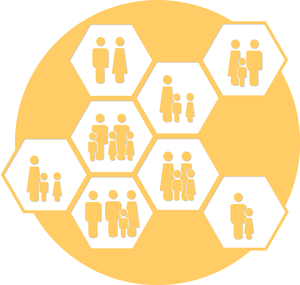

Developed by Dr. Murray Bowen, family systems theory emphasizes that people cannot be understood only as isolated, self-contained individuals, but must also be viewed as members of an “emotional unit” that is their family. Whether examining a person’s current family or family of origin (i.e. the family that the person was born into and/or grew up with), family systems theory looks at what roles the individual played, what responsibilities they took on, and how these factors may continue to play out in the person’s present life. [more info]
Internal Family Systems (IFS) is a model of therapy developed by Dr. Richard Schwartz that integrates systems theory and applies it to the internal psychology of human beings. IFS posits that everyone has multiple discrete sub-personalities (or “parts” of themselves), as well as a underlying core Self that is greater than the sum of their parts. IFS therapy aims to help people identify and get to know parts of themselves with curiosity and compassion, and in turn to help them shift out of unhelpful roles that they’ve been stuck in and into more adaptive roles in the present. IFS also works to unburden the effects of past trauma that parts of a person may be carrying. [more info]
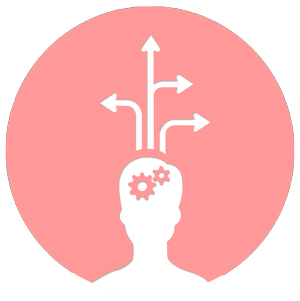
Cognitive-behavioural therapy is an approach that emphasizes the interaction between a person’s cognitions (thoughts and beliefs), behaviours (what they do), and emotions (moods, feelings). By altering patterns of thinking or behaving, people can learn to change the way they feel and become more empowered in their lives. CBT is a practical, rational, solution-focused approach to therapy that emphasizes a high degree of client engagement and often “homework” assignments between sessions to practice new skills. [more info]
Emotion-focused therapy (sometimes called process-experiential therapy) emphasizes the importance of working with one’s emotions: becoming aware of them, how to express them, regulate them, make sense of them, and ultimately transform emotional experiences. Emotions can give us important information about our needs in relationships and life in general, and therefore EFT aims to help clients develop their “emotional intelligence” and cultivate an empowering relationship with their emotions. One fundamental tenet of the emotion-focused approach is that the experience of primary, core emotions within the context of a supportive relationship can be healing and transformative, create a sense of wholeness, and foster personal growth and development. [more info]
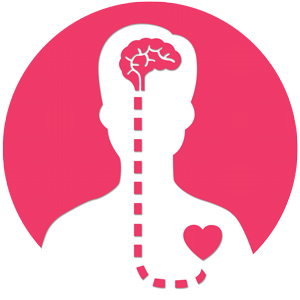

Emotion-focused therapy (sometimes called process-experiential therapy) emphasizes the importance of working with one’s emotions: becoming aware of them, how to express them, regulate them, make sense of them, and ultimately transform emotional experiences. Emotions can give us important information about our needs in relationships and life in general, and therefore EFT aims to help clients develop their “emotional intelligence” and cultivate an empowering relationship with their emotions. One fundamental tenet of the emotion-focused approach is that the experience of primary, core emotions within the context of a supportive relationship can be healing and transformative, create a sense of wholeness, and foster personal growth and development. [more info]

Narrative therapy focuses on the “stories” (i.e. narratives) that people tell themselves about themselves, their lives, and the world, and their experiences. By identifying, challenging, and modifying these stories, people can learn to construct new narratives and “be the authors of their own lives”. One useful aspect of this approach is the separation of people from their problems (rather than the pathologizing approach of identifying the person as the problem). Narrative approaches emphasize drawing on peoples’ innate skills, values, talents, creativity, and other internal resources to address the issues that they are facing in their lives. [more info]
Mindfulness can be defined as the awareness that arises from the intentional focusing of attention onto particular aspects of present-moment experience, without adding any judgments or interpretations to the experience itself. Rather than being on “autopilot” and without awareness of what the mind is attending to (i.e. mindlessness), mindfulness-based interventions strengthen awareness of what is going on in the present moment in our inner and outer worlds. Mindfulness aims to cultivate a nonjudgmental, receptive, and curious attitude toward human experience – ingredients which are particularly useful and conducive to effective psychotherapy. Paying attention mindfully to our reactions to different experiences and events can be effective in reducing the intensity of problematic, automatic reactions that can contribute to a variety of mental health issues (e.g. anxiety, panic, anger, depression), and increase our capacity to be fully present and enjoy our lives.
[more info]
Video: What Is Mindfulness?


Mindfulness can be defined as the awareness that arises from the intentional focusing of attention onto particular aspects of present-moment experience, without adding any judgments or interpretations to the experience itself. Rather than being on “autopilot” and without awareness of what the mind is attending to (i.e. mindlessness), mindfulness-based interventions strengthen awareness of what is going on in the present moment in our inner and outer worlds. Mindfulness aims to cultivate a nonjudgmental, receptive, and curious attitude toward human experience – ingredients which are particularly useful and conducive to effective psychotherapy. Paying attention mindfully to our reactions to different experiences and events can be effective in reducing the intensity of problematic, automatic reactions that can contribute to a variety of mental health issues (e.g. anxiety, panic, anger, depression), and increase our capacity to be fully present and enjoy our lives.
[more info]
Video: What Is Mindfulness?
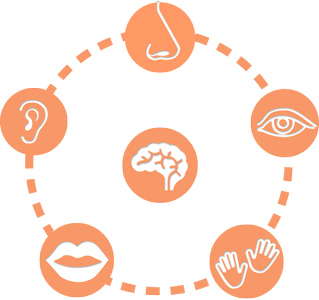
Sensorimotor psychotherapy pays special attention to the human body, noticing patterns of action, behaviours, and other physiological processes that show up for clients in therapy. Because there are often strong, automatic somatic (i.e. bodily) components that accompany emotional experiences, learning to become aware of, pay attention to, and work with the body can often be helpful in alleviating distress and suffering. Sensorimotor psychotherapy can be particularly useful in helping people to heal from the effects of psychological trauma in their lives. [more info]
